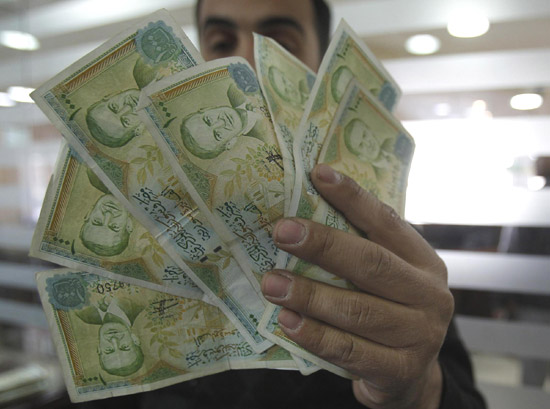Economic sanctions on Syria double-edged sword
Updated: 2011-12-07 09:25
(Xinhua)
|
|||||||||||
 |
|
A cashier checks Syrian currency notes in Amman December 6, 2011. Jordanian money changers said on Tuesday demand on the Syrian pound has plummeted since unprecedented Arab economic sanctions against Damascus, and its exchange rate against the dollar has slipped on the black market by at least 7 percent to nearly 57 pounds. [Photo/Agencies] |
DAMASCUS - The economic sanctions imposed by the Arab League (AL) on Syria are viewed by many observers as attempts to step up pressure on the Syrian government, but fears increase that the impacts would harm interests of other countries as much as that would affect Syria.
Some Syrian officials and economists said the sanctions would have minor impact on Syria's self-sufficient economy, but would provide a chance for the Syrian industrialists' self-reliance and self-improvement.
Syrian Vice Transport Minister Mahmoud Zanboua told Xinhua that the sanctions on Syria's import will encourage the local production as local products will enjoy an exclusive market without competition.
Jordanian Foreign Ministry spokesman Mohammed Kayed said recently that his country would be badly affected by the sanctions against Syria and had asked the AL to exclude the sectors of trade and aviation from the sanctions.
According to Jordanian Minister of Industry and Trade Sami Qammo, Jordan's trade volume with Syria since 2000 has amounted to about $7 billion, including two billion dollars of exports to Syrian and five billion dollars of imports from Syria.
Turkey, Syria's northern neighbor and one of the staunchest supporters of sanctions against Syria, would be the only loser after Syria abrogate the free trade zone agreement between the two countries, said Hamdi al-Abdallah, an economic analyst.
The Syrian government announced on Sunday that it had decided to suspend the free trade zone agreement in retaliation for the recent Turkish economic sanctions.
Mohammad Habash, a Syrian parliamentarian and moderate Islamic scholar, told Xinhua that many Syrian industrialists were glad of the decision, saying that the agreement was designed by the former Syrian government "for the bourgeois class that was achieving its goals on the shoulders of the poor and the underclass."
Syria's official news agency SANA reported Tuesday that the trade volume between Syria and Turkey leapt from 400 million dollars in 2004 to 2.2 billion dollars in 2010, and Turkey's share was about 70 percent.
Lebanon and Iraq, another two major trade partners of Syria, have been more vigilant about the affects of the sanctions on their economies. The two countries did not vote in favor of the sanctions during the AL meeting last week.
The trade volume between Syria and Iraq was two billion dollars in 2010 and is expected to reach up to three billion dollars by the end of this year, and about one-third of the Syrian exports went to Iraq, SANA said.
Lebanon said it could not take part in the sanctions against Syria because the latter is its only land passage to the Gulf states.
Syrian Economic Minister Mohammad Nidal al-Shaar said one day after the AL approved the sanctions that the sanctions were a "dangerous precedent that would eventually have profound impacts on the Syrian citizen."
However, "We will depend on our economic resources and strengthen them," he said.
Khaldoun al-Mouaqe, head of the Syrian side of the Syrian- Egyptian Business Council, underscored the necessity of exceptional decisions to facilitate the flow of Syrian goods via all land and maritime border crossings "to comply with the exceptional stage Syria is passing through."
He also pressed for the need to form an economic crisis team that has full executive prerogatives to handle the current situation and be the real decision maker. He said the team should have the power to implement decisions at the appropriate time and in accordance with urgent and new developments.
Hot Topics
HIV/AIDS, Egypt protest, Thanksgiving, climate change, global economic recovery, home prices, high-speed railways, school bus safety, Libya situation, Weekly photos
Editor's Picks

|

|

|

|

|

|







